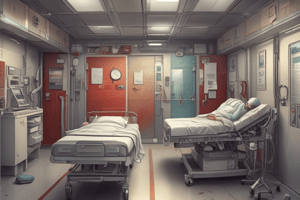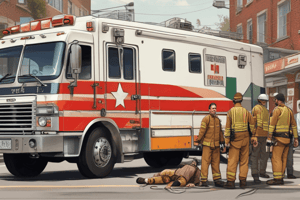Podcast
Questions and Answers
What is the primary responsibility of the Transportation Sector in a multiple-patient incident?
What is the primary responsibility of the Transportation Sector in a multiple-patient incident?
- Providing medical treatment to patients at the scene
- Arranging transportation needs for patients and allocating them to medical facilities (correct)
- Coordinating search and rescue operations
- Maintaining crowd control and scene security
How does the Transportation Sector determine hospital availability status?
How does the Transportation Sector determine hospital availability status?
- By contacting the hospital directly
- By checking with the Treatment Sector
- By contacting Dispatch on Med-9 (correct)
- By checking online hospital directories
What is the purpose of the Transportation Sector's progress reports?
What is the purpose of the Transportation Sector's progress reports?
- To provide progress reports, allocations, and ETAs to receiving hospitals (correct)
- To inform the public of the incident
- To provide updates to the Treatment Sector
- To request additional resources
What is the Transportation Sector responsible for allocating?
What is the Transportation Sector responsible for allocating?
Who is responsible for ensuring the safety and accountability of assigned personnel?
Who is responsible for ensuring the safety and accountability of assigned personnel?
What is the final notification made by the Transportation Sector?
What is the final notification made by the Transportation Sector?
What is the primary responsibility of the LZ Sector in air medical transport coordination?
What is the primary responsibility of the LZ Sector in air medical transport coordination?
Who advises Transportation when patients are ready for transport?
Who advises Transportation when patients are ready for transport?
What is the priority for transporting patients?
What is the priority for transporting patients?
What is the main responsibility of the Transportation Sector Officer or designee?
What is the main responsibility of the Transportation Sector Officer or designee?
Flashcards are hidden until you start studying
Study Notes
Transportation Sector Responsibilities
- Determine and request resources for patient transportation.
- Identify the rescue loading area and helicopter landing zone in coordination with Command.
- Determine hospital availability status by contacting Dispatch on Med-9.
Patient Allocation and Transportation
- Coordinate patient allocation and destination with Treatment Sector.
- Aggressively supervise patient movement from the treatment area to the ambulance loading area or helicopter landing zone.
- Maintain an accounting of all patients and their destinations.
- Provide progress reports, allocations, and ETA's to receiving hospitals.
Communication and Coordination
- Provide frequent progress reports to Command.
- Coordinate activities with other sectors, especially Treatment.
- Notify hospitals (through Dispatch) of estimated arrival time of specific rescues or helicopters.
- Notify Command when all IMMEDIATE patients have been transported.
Role of the Transportation Sector Officer
- Assume a visible position in the treatment area or patient loading area and wear a sector vest.
- "Size up" the transportation needs, including ambulances, air ambulances, and staffing needs.
- Communicate needs to Command.
Additional Roles and Responsibilities
- Hospital Communications Coordinator: assist with medical communications.
- Loading Coordinator: assist with transport loading.
- Charting Officer: assist with record keeping.
- LZ Sector: coordinate air medical transport.
- Staging: assist with staging of rescues.
Use of Helicopters and Ambulances
- Use helicopters to transport critical patients to distant medical facilities.
- Use ambulances or other vehicles to transport patients from the treatment area to the landing zone.
- Use ambulances to transport patients to closer hospitals.
Loading and Staging
- Establish a patient loading area next to the Treatment Sector.
- Stage rescues off-site and bring them in as needed, no more than two at a time.
- Ensure rescues and ambulances are immediately ready in the loading area.
- Ensure a separate entry and exit point for ambulances in the loading area.
Hospital Communication and Inventory
- Contact medical facilities to determine their capabilities and availability.
- Advise hospitals of the location, type of incident, triage report, and patient information.
- Initiate medical facility inventory by contacting Dispatch on Med-9 early during the incident.
Patient Transportation and Allocation
- Allocate patients to medical facilities based on injury, priority, hospital capacity, and specialty.
- Prioritize transport of IMMEDIATE patients, followed by DELAYED and MINOR patients.
- Consider using city busses or vans to transport MINOR patients to distant hospitals.
Tracking and Reporting
- Remove patients from the treatment area and deliver them to transport units.
- Use transportation tracking slips to maintain an accounting of all patients leaving the scene.
- Advise Dispatch on Med-9 of estimated arrival time and patient status after transport units have left the scene.
Studying That Suits You
Use AI to generate personalized quizzes and flashcards to suit your learning preferences.




